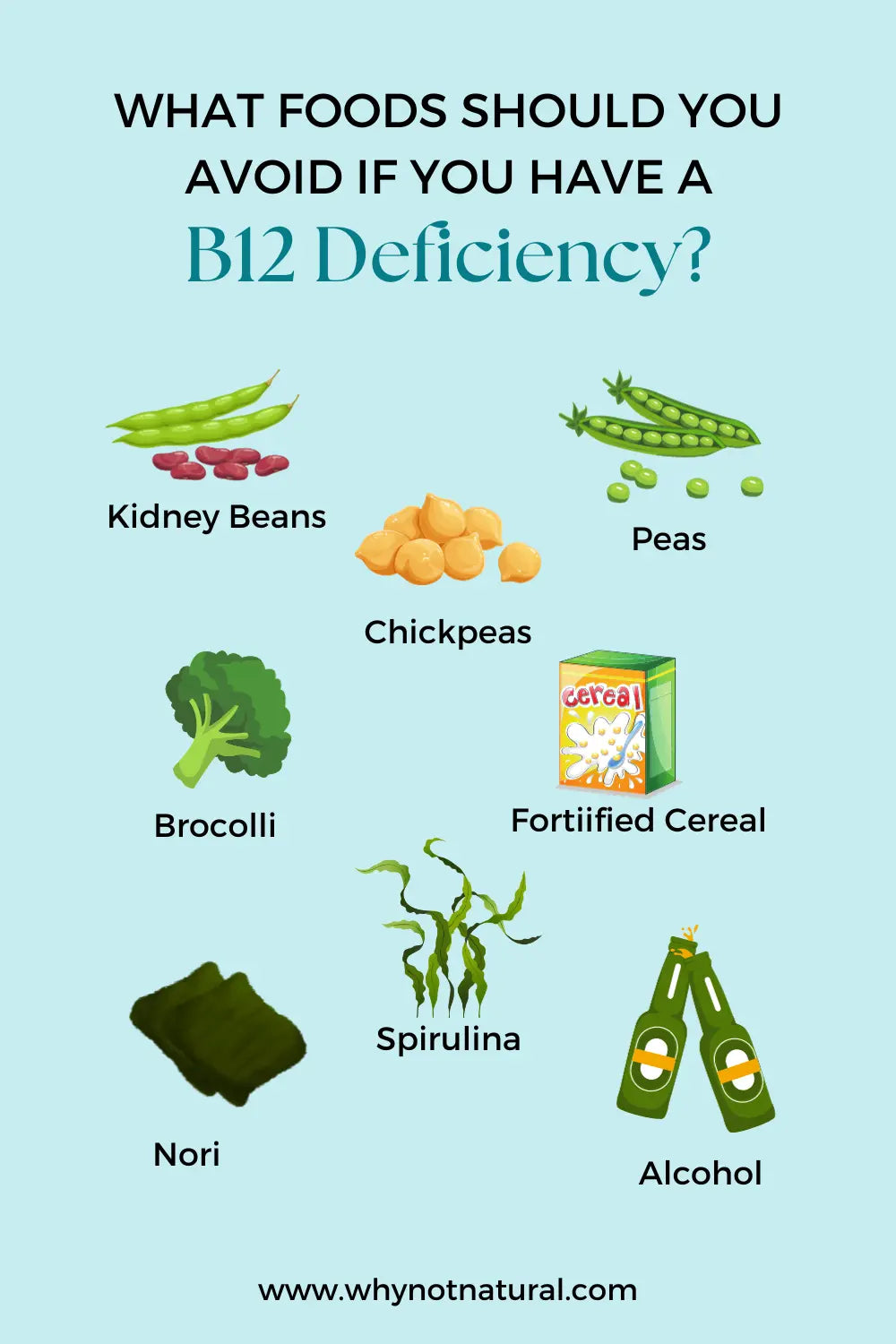

· By Lorea Lastiri
What Foods To Avoid And Why If You Have A B12 Deficiency?
What Foods To Avoid And Why If You Have a B12 Deficiency?
A vitamin B12 deficiency can lead to a range of uncomfortable symptoms, including low energy and mood changes. Certain foods may worsen a deficiency or make it harder to recognize when one is present. Understanding which foods to limit, along with which ingredients truly provide usable B12, can help support your overall well-being.
Vitamin B12 plays a key role in helping maintain normal red blood cell formation, neurological function, and energy metabolism. Because the body relies on regular intake of B12 from food or supplements, avoiding anything that interferes with its availability is especially important if you’ve been diagnosed with or suspect a deficiency.
Below is a breakdown of the foods and ingredients commonly misunderstood as “B12 friendly,” plus why they may not be helpful when you're working to support healthy B12 levels.
Folic Acid Fortified Foods
Synthetic folic acid (vitamin B9) supports red blood cell formation, but too much of it can mask signs of B12 deficiency. This can make it harder to identify the deficiency early. Fortified breakfast cereals, certain packaged grain products, and legumes like chickpeas and kidney beans are common sources of folic acid.
Consuming high amounts of folic acid may give a temporary sense of improved energy, even if B12 levels are low. Because the two nutrients play similar roles, overconsumption of folic acid can hide early warning signs of deficiency. This is why many healthcare professionals recommend avoiding more than 1,000 mcg of synthetic folic acid per day unless specifically instructed otherwise.
Too Much Synthetic Vitamin B12 (Cyanocobalamin)
Cyanocobalamin is a synthetic form of vitamin B12. While it is widely used, some individuals prefer taking a methylated form of B12, such as methylcobalamin. The recommended intake for adults is generally 2.4 mcg daily, with slightly higher amounts recommended for pregnancy and breastfeeding. People following plant-based diets may require more.
Individuals with a diagnosed deficiency may be advised by their healthcare provider to take higher supplemental amounts because only a small percentage of B12 is absorbed at a time. Choosing a naturally occurring form like methylcobalamin may be preferable for those avoiding synthetic forms.
Seaweed and Nori Are Not Reliable B12 Sources
Although seaweed is nutritious, it does not provide consistent, active vitamin B12. Nori and similar sea vegetables may contain compounds that resemble B12, but research shows these forms may not be biologically usable for humans.
This means seaweed should not be relied on to support B12 levels. Instead, pairing seaweed with a high-quality B12 supplement can help ensure you’re getting usable forms of the nutrient.
Spirulina Does Not Provide Active Vitamin B12
Spirulina is often marketed as nutrient-dense, but it contains B12 analogues—compounds that look like B12 but are not active in the human body. These analogues may even interfere with B12 testing by appearing as B12 on lab results without providing any benefit.
While spirulina offers other nutrients, it cannot support B12 levels and should not be used as a B12 source, especially for those who follow plant-based diets or are already deficient.
Alcohol
Alcohol consumption can make it harder for the body to maintain healthy nutrient levels, including vitamin B12. Alcohol may interfere with nutrient absorption and contributes to the loss of water-soluble vitamins.
Frequent or heavy alcohol use may make deficiencies more difficult to detect, as inflammation in the stomach or liver can influence how nutrients are absorbed. Limiting alcohol may support overall nutritional balance, especially when working to restore healthy B12 status.

In Conclusion
Supporting healthy vitamin B12 levels includes focusing not only on foods that contain B12, but also on foods and ingredients that may interfere with its availability. Avoiding excessive alcohol, limiting synthetic folic acid, and understanding that seaweed and spirulina are not reliable B12 sources can help you make more informed choices.
If recommended by your healthcare provider, a high-quality B12 supplement such as the Why Not Natural B12 liquid drops may help support healthy levels. The formula is made with methylcobalamin, a naturally occurring form of B12. Our all natural B12 supplements even come in an enjoyable and fully organic cherry flavor!
Want more tips like this?
Join our newsletter to learn how to choose supplements, how to combine them effectively, and simple habits that support steady energy and overall well-being. You’ll also get practical guidance for managing stress and maintaining hormonal balance. Click here to get started!
Disclaimer
The statements in this article have not been evaluated by the Food and Drug Administration. The products mentioned are not intended to diagnose, treat, cure, or prevent any disease. Please check with a doctor before starting any new supplement and to ensure the advice in this article is right for you.
